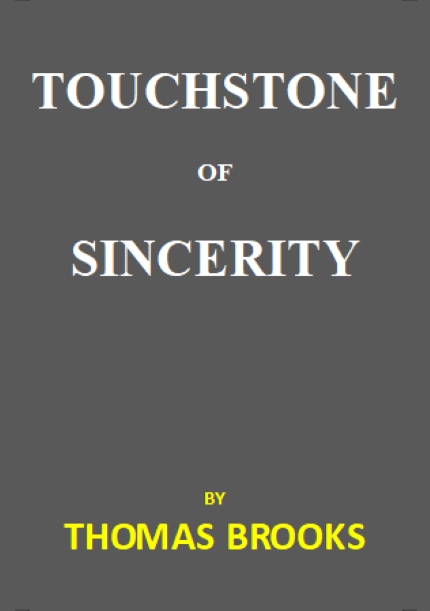By Thomas Brooks.

Touchstone of Sincerity.
By Thomas Brooks.
Thomas Brooks as Puritan minister:
Thomas Brooks served as a Puritan minister during the 17th century in England. He is known to have preached at various churches and congregations in and around London.
One of his earliest ministry positions was as a chaplain in the English Civil War, serving the Parliamentary forces. He then became a pastor at St. Thomas’ Church in Southwark, a parish in the city of London, where he served for several years.
After leaving St. Thomas’ Church, Brooks continued to preach and minister to various congregations throughout London. He was a popular preacher and was known for his ability to connect with his listeners and to bring the message of Christianity to life.
Despite facing persecution and opposition from the authorities, Brooks remained committed to his calling as a minister and continued to preach and write throughout his life. His works were widely read and influential, both in his own time and in the centuries that followed.
About his book: Touchstone of Sincerity:
Thomas Brooks’ book “The Touchstone of Sincerity” is a work that addresses the important topic of Christian sincerity. Published in 1661, the book seeks to help readers evaluate their own sincerity in their faith and their relationship with God.
Brooks begins by defining what he means by “sincerity,” which he defines as the quality of being genuine and free from hypocrisy. He argues that sincerity is an essential quality for any Christian who wishes to grow in their faith and become more like Christ.
The book is structured around a series of questions that Brooks poses to his readers, such as “What is Christian sincerity?” and “How can we attain to sincerity in our Christian walk?” He offers detailed and practical advice on how to cultivate sincerity in various aspects of one’s life, such as prayer, reading the Bible, and interacting with others.
Throughout the book, Brooks emphasizes the importance of examining oneself honestly and humbly, and of striving to be authentic in all of one’s actions and attitudes. He warns against the dangers of outward religious showmanship and hypocrisy, and encourages his readers to focus on developing true inward sincerity.